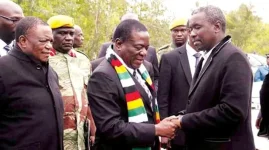War veteran Blessed Geza has accused businessman Kudakwashe Tagwirei of a major political scheme. He claims President Emmerson Mnangagwa secretly grooms Tagwirei as Zimbabwe's next president. This plan would block Vice President Constantino Chiwenga from taking power. ZANU PF's Harare Province recently backed Geza for a Central Committee seat.
Tagwirei has built substantial power behind the scenes across Zimbabwe. He landed massive government deals, including the multimillion-dollar Mbudzi Interchange flyover project. His business empire spans mining operations and fuel companies nationwide. The ruling party just put his name forward for an influential Central Committee position.
Geza harshly criticized Tagwirei for corrupt activities and attempting to seize control of Zimbabwe through backdoor methods. He challenged Tagwirei about hoarding government contracts through dishonest practices. Geza declared Tagwirei conspires with Mnangagwa on presidential ambitions despite lacking any formal political role.
ZANU PF suffers from deep internal splits over who leads next. One faction pushes for Mnangagwa to remain president past 2030. The opposing group supports Chiwenga as the rightful next leader. Geza suggests Tagwirei serves as a third option designed to prevent Chiwenga from ever becoming president.
Geza further accused Tagwirei of undermining Zimbabwe's historic land reform program that gave farmland back to black Zimbabweans. He questioned why two separate banks manage such a crucial national initiative. Geza insisted that Tagwirei abandon attempts to reverse these essential land reforms.
President Mnangagwa regards Tagwirei as an essential ally. The businessman influences national policies through several key positions. His leadership in both the Command Agriculture program and the Land Tenure Implementation Committee sparked worries about his control over farming and property policies.
Journalists repeatedly attempted to contact Tagwirei regarding these accusations. He failed to respond to any questions before the publication deadline. This escalating dispute highlights growing tensions within Zimbabwean leadership circles.
These allegations reveal widening cracks in ZANU PF unity and heighten the power struggle among senior officials. With uncertainty about Mnangagwa's future leadership and threats to Chiwenga's presidential hopes, Zimbabwe faces an unclear political future. The emergence of Tagwirei as a potential presidential candidate adds even more complexity to an already volatile situation.
Tagwirei has built substantial power behind the scenes across Zimbabwe. He landed massive government deals, including the multimillion-dollar Mbudzi Interchange flyover project. His business empire spans mining operations and fuel companies nationwide. The ruling party just put his name forward for an influential Central Committee position.
Geza harshly criticized Tagwirei for corrupt activities and attempting to seize control of Zimbabwe through backdoor methods. He challenged Tagwirei about hoarding government contracts through dishonest practices. Geza declared Tagwirei conspires with Mnangagwa on presidential ambitions despite lacking any formal political role.
ZANU PF suffers from deep internal splits over who leads next. One faction pushes for Mnangagwa to remain president past 2030. The opposing group supports Chiwenga as the rightful next leader. Geza suggests Tagwirei serves as a third option designed to prevent Chiwenga from ever becoming president.
Geza further accused Tagwirei of undermining Zimbabwe's historic land reform program that gave farmland back to black Zimbabweans. He questioned why two separate banks manage such a crucial national initiative. Geza insisted that Tagwirei abandon attempts to reverse these essential land reforms.
President Mnangagwa regards Tagwirei as an essential ally. The businessman influences national policies through several key positions. His leadership in both the Command Agriculture program and the Land Tenure Implementation Committee sparked worries about his control over farming and property policies.
Journalists repeatedly attempted to contact Tagwirei regarding these accusations. He failed to respond to any questions before the publication deadline. This escalating dispute highlights growing tensions within Zimbabwean leadership circles.
These allegations reveal widening cracks in ZANU PF unity and heighten the power struggle among senior officials. With uncertainty about Mnangagwa's future leadership and threats to Chiwenga's presidential hopes, Zimbabwe faces an unclear political future. The emergence of Tagwirei as a potential presidential candidate adds even more complexity to an already volatile situation.












